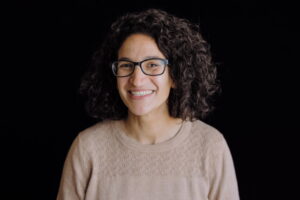Jewish Family Service is excited to welcome Rabbi Ronit Tsadok as the new Director of Project Kavod, a JFS initiative that ties the vital work we do to the core Jewish values that inspire and guide our mission. With over 12 years of experience as a rabbi at IKAR in Los Angeles, Rabbi Ronit brings a wealth of knowledge and a deep commitment to creating inclusive Jewish communities rooted in love, tradition, and justice. In a recent interview, she shared her journey—from growing up in a traditional Jewish home to becoming a passionate advocate for inclusivity and social change. Welcome Rabbi Ronit!
What brought you to JFS? 
As my wife and I were considering a move to Seattle, I learned about this incredible organization, deeply rooted in Judaism, that serves both the Jewish and refugee communities in meaningful and impactful ways. I was inspired to learn more about JFS and thrilled by the opportunity to bring my experience as a rabbi to a team of dedicated, passionate individuals.
Can you share a little about your background and professional experience?
I grew up in a traditional Jewish home, always feeling a strong connection to my Jewish identity. I’ve loved Jewish learning and traditions, such as the weekly rhythm of Shabbat and the cycle of the holidays. As I got older, I sought out Jewish spaces where I could be openly and proudly a gay woman. This passion for inclusivity led me to rabbinical school, where I became committed to creating inclusive Jewish communities rooted in love and tradition.
For the past 12 years, I served as a rabbi at IKAR in Los Angeles, where I was involved in all aspects of the community. This included our justice initiatives, education programs for infants through teens, Shabbat and holiday services, communications, and various programs. It was an incredibly rewarding experience that shaped me both personally and professionally.
What is your approach to Jewish education, and/or education in general? Which groups (ages, etc.) have you worked with in your career?
I believe that Jewish texts and stories belong to everyone, regardless of their background, experience with traditional study, or identity. I love the opportunity to share a text that has inspired or even troubled me, and hearing how others interpret it. I also love to incorporate music into my teachings. I have had the blessing of working with all ages, from infants to adults, and I enjoy tailoring my approach to meet the needs and interests of those I’m teaching.
How do you see Jewish values informing or guiding the community programs and services we offer?
Jewish values are woven into everything we do at JFS. One of the most essential and frequently repeated teachings in the Torah is that, having been strangers in Egypt, we have a responsibility to care for—and even love—the stranger. There are many mitzvot (commandments) in the Torah and rabbinic literature that instruct us to provide for those in need, such as leaving a corner of our fields for the poor and establishing funds to support others. The mitzvah to “love your neighbor as yourself” serves as the foundation for the interpersonal commandments in our tradition, which guide much of our work.
Was there a particular experience or mentor in your life that guided you toward a career in Jewish education and community service?
One of my greatest teachers is Rabbi Sharon Brous, who founded a community rooted deeply in traditional Jewish prayer and practice, while also committed to bringing greater dignity and peace to the world. She helped me see how to fully live my Jewish identity, working toward a world that reflects our highest values and aspirations.
As we approach the upcoming presidential election, how do you see Jewish values informing the way we engage with civic responsibilities and community discourse?
Judaism, with its long tradition of debate and values clarification, has much to say about respectful disagreement. In the Talmud, the school of Hillel was famous for teaching the opinion of the school of Shammai, with whom they often disagreed, even before teaching their own position. [Babylonian Talmud, Eruvin 13b]
Pirkei Avot [5:17] speaks of a makhloket l’shem Shamayim, a “disagreement for the sake of Heaven”. As we engage in debate and civic discourse, it is imperative to ensure that why and how we engage honors the Divine image and dignity of others.
What are some of your favorite traditions or practices during the High Holidays that you find particularly meaningful?
As a child, I always loved the simanim (symbolic foods) we ate during Rosh Hashanah, also known as the yehi ratzons. We would eat foods like apples and honey for a sweet new year, beets to represent protection from harm, and fish heads so we could be like the head and not the tail. You can find the full seder here!
Outside of your professional life, what brings you joy and balance?
New to Seattle, I love exploring the city with my wife, Sarah, and our two kids, Noa and Lucy. We’re always on the lookout for fun brunch spots and parks to explore. I also enjoy singing and hitting the batting cages in my free time!
To get in touch with Rabbi Ronit Tsadok, you can email her at rtsadok@jfsseattle.org.




Sorry, comments are closed for this post.